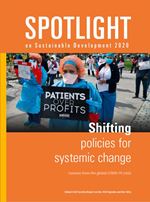
|
By Mira Bierbaum, Thomas Gebauer and Nicola Wiebe
Global Coalition for Social Protection Floors
Download this chapter in pdf format here.
The health and socioeconomic crisis caused by COVID-19 has shown in a dramatic fashion that we are only as safe as the most vulnerable among us. Despite previous legal and policy commitments and laudable progress in many countries, only between one-third and one-half of the world’s population were covered by essential health services.1 More than 55 percent had no access to social protection at all, with devastating consequences for societies worldwide.2 Millions of people have already fallen into poverty, are suffering from hunger and destitution or have died. The crisis has put into sharp relief the large underinvestment in public health systems that struggle to detect, isolate and treat cases.
It has also demonstrated the need for robust and comprehensive social protection systems that protect individuals against income losses in case of sickness or job loss and that reduce the depth and duration of economic downturns by means of counter-cyclical spending.
Financing universal social protection for all is possible
Even before the COVID-19 pandemic threw the world into turmoil, low- and middle-income countries were confronted with large financing gaps in social protection, amounting to more than US$ 500 billion annually.3 While these gaps are without doubt significant – in low-income countries, they amount to 5.6 percent of Gross Domestic Product (GDP) – they represent only about 0.05 percent of the GDP of all high-income countries or 1.4 percent of all illicit financial flows.
The world is literally swimming in money. Due to the misguided financial and fiscal policies of the past decades, it is simply not where it is needed. Today, public coffers are in dire straits and the managers of investment funds are eagerly looking for new opportunities. They have recently found them in the healthcare sector – with the precarious consequences that became apparent in the coronavirus crisis.
International justice, including, among other measures, international tax justice, is urgent. Tax havens and tax evasion by multinational companies undermine successful tax collection, especially in countries where funds to cover public social expenditure are already scarce. In order to effectively protect and increase the national resource base, regulation and enforcement of tax justice at the international level is essential.
Beyond this, however, international solidarity is needed in the form of a global financing mechanism for social protection. In line with the solidarity principl of social policy, a “Global Fund for Social Protection” should be endowed with resources according to the financial capacity of states and disbursed according to social needs. This would support efforts to fulfil commitments to achieve the Sustainable Development Goals (SDGs) and to jointly realize the human right to social security. Without the fair use of existing wealth, without redistribution, the global crisis will not be resolved. Rescue, however, is possible; the resources are there; it should not fail due to a lack of solidarity.
From commitments to implementation
In the aftermath of the global financial crisis 2008 – 2009, governments and social partners adopted the ILO Social Protection Floors Recommendation, 2012 (No. 202) that provides guidance to Member States to establish and maintain national social protection floors and progressively increase levels of protection. The global commitment to universal social protection was reaffirmed in the 2030 Agenda with SDG 1.3 calling on governments to “implement nationally appropriate social protection systems and measures for all, including floors” by 2030. Such floors guarantee access to essential healthcare and income security throughout the life cycle, for example in the form of child or family benefits, benefits in the case of illness, unemployment, disability and old age. In principle, States bear the overall responsibility to establish and maintain these floors, based on principles of universality, social solidarity and non-discrimination, social dialogue and solidarity in financing. Yet, if economic and fiscal capacities are insufficient, the Recommendation also states that States could seek international support.
A fundamental international consensus and repeated voluntary commitments by governments and social partners are hence already on the table. What is required now with great urgency is the implementation of these commitments. Civil society has an important role to play in advocating for and participating in the development of a social policy based on global solidarity.
The health and economic crisis has been an eye-opener for many people. What has long been considered utopian seems possible today, demonstrated by appeals for solidarity, greater appreciation for care-givers, citizens’ initiatives to cater for the needs of others in their neighbourhoods and a flurry of government actions that aim at equity in many countries. These demonstrations of solidarity are important and a fundamental aspect of functioning sociality. But they remain insufficient as long as sociality is only thought of in a national context.
Notwithstanding the challenges, we seek a reorientation of human living environments towards the principle of preserving care, both for one another and for the environment. We urgently need global social conditions in which the guaranteed rights of freedom are given a socio-political framework determined by solidarity. This requires from all of us an attitude of cosmopolitan solidarity, which is also directed towards those who are strangers to us and who may have very different lifestyles from our own.
The article “We are only as safe as the most vulnerable among us” - Strengthening public health and social protection systems in response to the COVID-19 pandemic, by Mira Bierbaum, Thomas Gebauer and Nicola Wiebe, Global Coalition for Social Protection Floors is published in the Spotlight on Sustainable Development 2020, Shifting policies for systemic change Lessons from the global COVID-19 crisis.
Notes:
2 ILO (2017): World Social Protection Report 2017-19: Universal Social Protection to Achieve the Sustainable Development Goals. Geneva http://www.social-protection.org/gimi/gess/ShowWiki.action?id=594.
3 Durán Valverde, Fabio/José Pacheco Jimenez/Taneem Muzaffar/ Hazel Elizondo Barboza (2019): Measuring Financing Gaps in Social Protection for Achieving SDG Target 1.3: Global Estimates and Strategies for Developing Countries. Working paper 073. Extension of Social Security (ESS) Paper Series. Geneva: ILO. http://www.ilo.org/secsoc/information-resources/ publications-and-tools/Workingpapers/WCMS_729111/lang--en/index.htm.